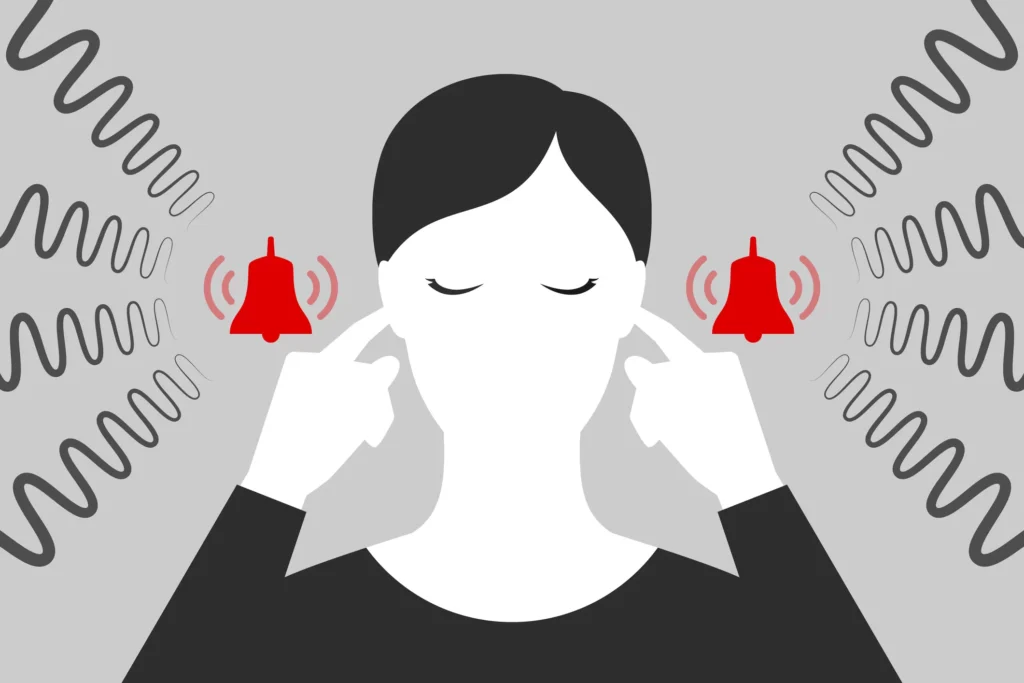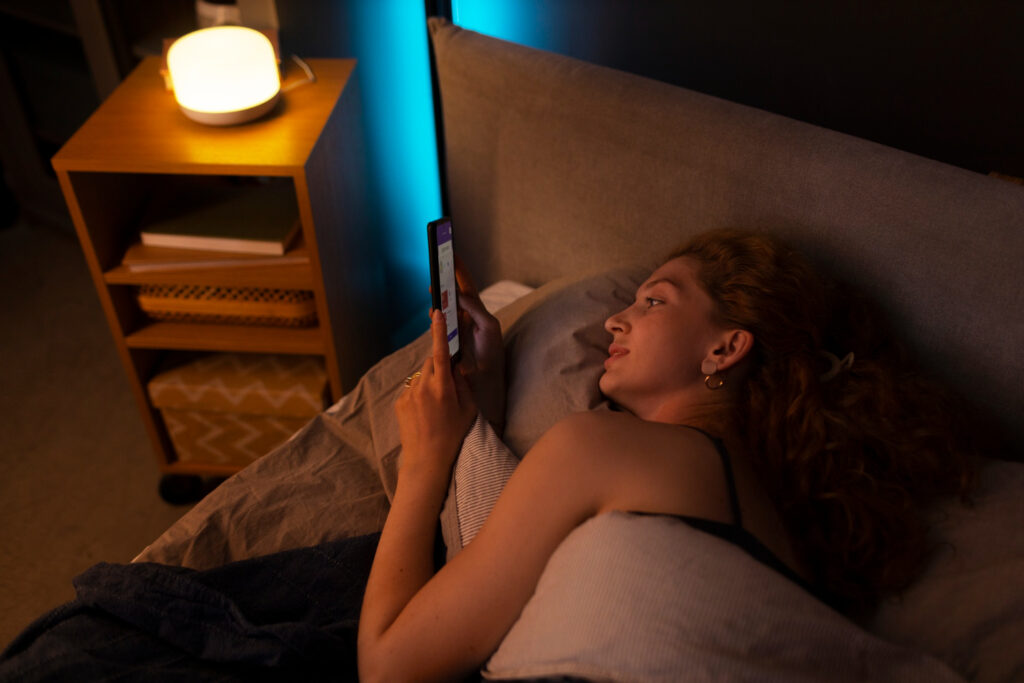It’s 11:30 PM. You’ve turned off Netflix, brushed your teeth, and snuggled under your favorite comforter. Everything is perfect for a good night’s sleep – except for that persistent ringing in your ears that suddenly seems to be performing at concert-level volume.
Sound familiar? If you’re among the millions of Americans who experience tinnitus (that phantom buzzing, ringing, or whooshing that only you can hear), you’ve probably noticed this frustrating pattern. The same sound that barely registered during your busy day now feels like it’s been amplified through stadium speakers.
But why does this happen, and more importantly, what can you actually do about it? Let’s explore this common experience with practical solutions you can try tonight.

Why Your Ears Get Chatty After Dark
The Hustle and Bustle Effect
During daylight hours, you’re surrounded by a symphony of sounds:
- Your colleague’s keyboard tapping away
- The coffee shop chatter during your afternoon break
- Car horns and traffic on your commute
- The TV playing in the background while you cook dinner
“These everyday sounds create a natural masking effect,” explains Sarah, who runs a popular tinnitus support community. “It’s like trying to hear someone whisper during a party versus in a silent library – the background noise during the day helps drown out the tinnitus.”
When night falls and these environmental sounds disappear, there’s nothing left to compete with that ringing. It’s not actually getting louder – it’s just that there’s less noise to hide behind.

Your Brain’s Nighttime Spotlight
Think about what happens when you turn off the lights in a room with a small blinking device – suddenly, that tiny light seems much brighter, right? Your brain processes sounds in a similar way.
During the day, your attention is divided between work tasks, conversations, phone notifications, and countless other inputs. At night, with fewer distractions, your brain has more bandwidth to notice the tinnitus that was there all along.
“It’s like how you don’t notice the refrigerator humming until everything else goes quiet,” explains Mark, a sound therapist who works with tinnitus clients. “Suddenly it’s the main thing you can hear.”
The Day’s Stress Comes Home to Roost
Many people find that stress makes their tinnitus more noticeable, and let’s be honest – bedtime is often when the day’s worries decide to have their reunion party in your mind.
As you lie there trying to sleep, thoughts about tomorrow’s presentation or that awkward thing you said three weeks ago start circulating. This mental stress can actually make your tinnitus perception more intense, creating a frustrating cycle:
- Tinnitus seems louder at night
- You worry about not sleeping because of the tinnitus
- The worry increases stress
- Increased stress makes tinnitus seem even louder
- Repeat until you’re staring at the ceiling at 3 AM
7 Lifestyle Tweaks That Actually Help
Let’s cut to the good stuff – here are practical approaches that real people use to turn down the volume on nighttime tinnitus:
1. Create Your Perfect Sound Bubble
Background sound is your best friend when it comes to nighttime tinnitus management. Consider:
- Rainfall or nature sounds: Many people find natural sounds more soothing than mechanical white noise
- Fan or air purifier: These provide dual benefits of consistent sound and improved air quality
- Sound machines: Dedicated devices with various sound options to find your perfect match
- Smartphone apps: Try apps like “Relax Melodies” or “White Noise Lite” that offer customizable sound blending
“I combined the sounds of light rainfall with distant thunder on my app, and it’s been a game-changer,” shares Jamie on a tinnitus forum. “I can still technically hear my tinnitus if I focus on it, but the rain sound gives my brain something more pleasant to latch onto.”

2. Wind Down Like You Mean It
Your evening routine sets the stage for how well you’ll manage nighttime tinnitus:
- Digital sunset: Try putting screens away an hour before bed (the blue light can increase alertness and make tinnitus more noticeable)
- Warm shower ritual: The temperature drop after a warm shower naturally makes you sleepy
- Gentle stretching: Especially focusing on your neck and jaw, where tension often connects to ear discomfort
- Relaxing tea: Non-caffeinated options like chamomile, valerian root, or lemon balm
- Journaling: Jotting down tomorrow’s to-dos helps clear mental clutter
“I started setting my phone to automatically go into ‘bedtime mode’ at 9 PM, which turns the screen black and white and limits notifications,” explains Terry, who’s had tinnitus for five years. “That one change reduced my sleep onset time from over an hour to about 20 minutes.”
3. Rethink Your Sleep Setup
Your bedroom environment matters more than you might think:
- Temperature: Most sleep experts recommend keeping your bedroom cool (around 65-67°F)
- Bedding: Some tinnitus experiencers find slightly elevating their head reduces nighttime symptoms
- Darkness: Blackout curtains help signal your brain that it’s sleep time
- Comfort investments: A quality mattress and pillows that properly support your neck can reduce physical tension that may contribute to tinnitus awareness
“After trying dozens of supposed solutions, what actually helped me most was something simple – I raised the head of my bed by about four inches,” shares Dina in an online tinnitus community. “That slight elevation changed something about the pressure or blood flow, and my nighttime tinnitus became much less intrusive.”

4. Friend, Not Foe: Changing Your Relationship with the Sound
This approach takes practice but has helped countless people:
- The ‘noticing without judging’ technique: When you hear the ringing, simply acknowledge it without labeling it as “annoying” or “keeping me awake”
- Reimagining the sound: Some people find success in mentally recategorizing the sound as something pleasant (like distant wind chimes or gentle ocean waves)
- The paradoxical approach: Spend 10 minutes actively listening to your tinnitus before bed, which counterintuitively often makes it less noticeable afterward
“Learning to say ‘Oh, there’s that sound again’ instead of ‘Oh no, not the ringing again!’ completely transformed my sleep,” explains Ryan, who’s managed tinnitus for over a decade. “It took practice, but eventually, my brain started treating it like the ticking of a clock – just background noise that doesn’t deserve my attention.”
5. Daytime Habits That Pay Off at Night
What you do during the day affects how you’ll experience tinnitus at night:
- Hydration matters: Even mild dehydration can make tinnitus more noticeable
- Movement: Regular physical activity improves sleep quality and reduces stress
- Caffeine timing: Consider cutting off caffeine earlier in the day (try 2 PM as a starting point)
- Sound exposure: Some find that maintaining consistent background sound throughout the day (not just at night) helps train the brain to be less reactive to tinnitus
“I started wearing my earbuds with gentle background music during my workday,” shares Melissa, a graphic designer with tinnitus. “Having that consistent sound exposure seemed to ‘calibrate’ my brain, making the transition to nighttime less jarring.”
6. The Breath-Body Connection
Simple breathing techniques can shift your nervous system from “alert mode” to “rest mode”:
- 4-7-8 breathing: Inhale for 4 counts, hold for 7, exhale for 8 counts
- Body scan relaxation: Mentally move from toes to head, relaxing each part of your body
- Left-nostril breathing: A yogic technique that supposedly activates the calming side of your nervous system
“I was skeptical about breathing exercises until I actually tried them consistently,” admits Jordan, who developed tinnitus after attending too many concerts. “Now I do the 4-7-8 pattern every night in bed, and it helps shift my focus away from the ringing while relaxing my entire body.”

What Real People Say Works Best
We reached out to members of several tinnitus communities to ask what’s actually helped them most with nighttime tinnitus. Here’s what they shared:
Alex M., Teacher
“Consistency has been key for me. I use the same rainfall sound every night, keep my bedroom around 66 degrees, and do the same wind-down routine. On nights when I stick to this ritual, my tinnitus rarely bothers me anymore.”
Taylor J., Software Developer
“The game-changer for me wasn’t finding the perfect sound machine or supplement – it was changing how I think about the sound. Once I stopped seeing tinnitus as my enemy and started treating it like an annoying roommate I have to tolerate, the emotional charge disappeared, and it became background noise.”
Jamie F., Retired Police Officer
“I created what I call my ‘sleep sandwich’ – 15 minutes of light stretching, followed by 10 minutes of reading something enjoyable (never news!), and finished with 5 minutes of deep breathing while listening to ocean waves on my sound machine. This combination seems to override my tinnitus awareness.”
Dr. Sarah K., Psychologist and Tinnitus Experiencer
“As both a psychologist and someone with tinnitus, I’ve found that the most effective approach combines practical sound masking with mental reframing. I use a sound machine, but I’ve also practiced thinking about my tinnitus differently – not as an invader, but simply as part of my personal soundscape. That mental shift has been as powerful as any gadget.”
The Gentle Reminder
If your tinnitus:
- Has suddenly changed or appeared
- Is pulsing in rhythm with your heartbeat
- Comes with dizziness or hearing changes
- Is accompanied by physical pain
…it’s worth checking in with a healthcare provider. While most tinnitus isn’t harmful, these situations deserve professional attention.

The Bottom Line
Nighttime tinnitus amplification isn’t just “in your head” – it’s a very real experience with logical explanations. The good news is that with some environmental adjustments and perspective shifts, most people can significantly reduce its impact on their sleep and wellbeing.
Remember that improvement often comes gradually rather than overnight. Many tinnitus experiencers report that consistency with these approaches yields better results over time as your brain adapts.
With patience and the right combination of strategies, you can relegate that nighttime concert to background noise – allowing you to conduct more restful, rejuvenating sleep.
Disclaimer: This article is intended for informational purposes only and does not constitute medical advice. The strategies discussed may not be appropriate for everyone. Always consult with a qualified healthcare provider regarding any health concerns or before making any changes to your health routine.

Sources: This article was inspired by research from the American Tinnitus Association and insights from sleep science publications. Additional context was gained from conversations with tinnitus community members who shared their personal experiences. All content has been originally created by our wellness team while being informed by the latest understanding of tinnitus and sleep science.



